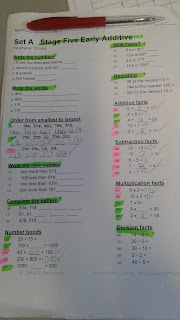| Activity 1: Create a reflective entry in which you reflect on what you have done so far to take action. |
How can the use of robotics and learning with collaborative groups, be used to promote student engagement and have a positive impact on mathematical outcomes?
The action plan - Week 1
- Inform senior management during a team meeting before school starts back
- We will inform students
- Parents - newsletters 1:1
- Student baseline data - number knowledge test
So far I have informed the senior management team during our team planning meeting prior to school starting. I have explained to the students that I am doing some research and I have collected baseline data through a number knowledge test which has been marked and shared with the students so they know what their starting point is, which relates to Tino Rangatiratanga - which enables students to know what their starting point is and what their next steps are.
I have highlighted in green the questions they got incorrect and pink the questions they got correct to reinforce this concept.
I have highlighted in green the questions they got incorrect and pink the questions they got correct to reinforce this concept.
What I have not done is inform the parents. I will endeavour to do this by the end of this week through the weekly newsletter as well as an individualised letter to the parents of the specific children I am targeting.
I am also meeting with parents next Wednesday at Meet the Teacher evening. I will target specific parents to talk to about my research project.
Step 2: Reflect on the actions
It can be exciting when you bring changes to your practice and you may expect others to wholeheartedly embrace them, however, acting on the new strategies might be not as easy. Things might not happen as you expect or the reaction of the people who are involved is not what you want.
In this step, use the following questions to guide your thoughts
- How do you feel about the actions you have taken?
- I feel that the management team is excited about the area thatI have chosen - robotics and maths and improving student outcomes as it is a school wide goal. The students seemed indifferent about the idea of the research. I think this is because I haven't built a relationship with them. I also feel disappointed that I have over looked informing the parents as whanau is such an important aspect. Katoa website
- What works as expectation and what doesn’t? And why? Building student/teacher relationships should be my first priority. (Ministry of Education, 2014) I would normally never give students a math test in the first week of school. I would wait until I have built a relationship with the students and I know the students feel comfortable and safe in their environment. As a result collecting marking and analysing the baseline data has taken a lot longer to do than first thought.
- I started with the first lesson using Beebots and discovered that 4 of them don't work and some of the batteries are flat and need replacing. Out of the 10 Beebots only half of them worked. So I had to rotate the groups which gave each group less play time to learn how to use the robot.
- What should be done differently? How would you justify this? In the action plan when informing the parents I discussed using meet the teacher evening, newsletters and parent interviews as a way to communicate with parents, however on reflection I feel it would be more personal and build better relationships if I was to write a letter to each parent and discuss their child as an individual rather than as a member of a group. It is also a good way of getting to know the parents on a more personal level. I will also invite the parents in to have an informal chat regarding their childs progress and the process they are going through. Katoa website
Step 3: Examine your reflection in relation to other phases of the Spiral of Inquiry and within wider frameworks/theories
Looking at the Spiral of Inquiry and my original 'Hunch' I still believe that I can improve student outcomes in maths using robotics, however I feel it will take longer than the course dates to achieve and I will need to continue long after MindLab has finished to see real improvement.
SkillsTeamHullUni (2014) in the Reflective Writing video (1:03-1:14) suggest that when you reflect on the action(s), “don’t concentrate on the actions in isolation, you need to take a metaphorical step backwards to see them in the context of other events and other learning”.
It is, therefore, necessary for you to look at what you have done in the context of other phases in your inquiry and wider frameworks/theories. For example, how has the Learn phase, in which you consider the ethical issues of your inquiry, helped you to mitigate the possible intrusion of the inquiry in student learning. Or, for Develop a Hunch phase (examine the resources), does the literature provide you with ideas about how to act? What does it say? How do they play out in practice? What needs to be changed? Or what leadership style/theory have you employed when you take action(s)? In what ways did it help you to take action?
In this step, it important to support your reflection with relevant resources, for example, references of literature around your inquiry topic or references of leadership theories.
Now add notes to your reflective entry.
If your reflective journal is in the form of a blog, either hyperlink the resources or have in-text citation together with a reference list at the end.
Ministry of Education. (2014, April 18). Setting the direction. Retrieved February 10, 2019, from http://nzcurriculum.tki.org.nz/Reviewing-your-curriculum/Setting-the-direction/Know-your-learners
Kaupapa Māori Research [Web log post]. (n.d.). Retrieved from http://www.katoa.net.nz/kaupapa-maori


No comments:
Post a Comment